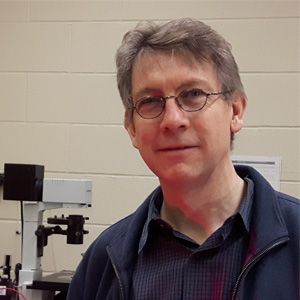Meet The Team
Description:
The Chica Lab develops novel proteins with useful properties for their application in chemistry and biology. In particular, they develop new biocatalysts for asymmetric synthesis of unnatural amino acids as well as genetically-encoded biosensors based on fluorescent proteins for in vivo imaging applications. To achieve these goals, Chica’s group conceives and exploits cutting-edge computational protein design algorithms to help predict mutations that will lead to the desired protein property. They have successfully applied these methods to predict and design protein stability, specificity and dynamics, and are now focusing on the de novo design of allostery and enzymatic catalysis.
Keywords:
Computational protein design; biocatalysis; enzymes; biosensors; fluorescent proteins; protein dynamics
Description:
The Woolley group designs and characterizes light-switchable proteins. Research on light-controlled proteins provides fundamental knowledge about protein conformation, folding, and dynamics. It also leads to the development of powerful tools (often called optogenetic tools) for the analysis and engineering of complex biological systems. CREATE trainees in the Woolley group will learn how design, discover, express, characterize and use proteins that are controllable by light. These proteins find applications in areas ranging from neurobiology to the production of biofuels.
Keywords:
Optogenetics; phage display; NMR; protein design; chemical modification
Description:
The daCosta lab seeks an atomic-level understanding of ligand-gated ion channel structure, function and mechanism, and to exploit ligand-gated ion channels as engineered molecular sensors. Employing an evolutionary biochemistry approach, they resurrect and study ancestral ion channels to trace their evolutionary history, and uncover the innovations in amino-acid sequence that led to current ion channel structural and functional diversity. In parallel, they engineer ligand-gated ion channel agonist specificity, with the aim of creating a new class of genetically encoded biological sensors.
Keywords:
Ligand-gated ion channel; ancestral protein reconstruction; evolutionary biochemistry; patch clamp electrophysiology
Website:
Description:
Meiering’s group aims to obtain a quantitative, predictive understanding of the molecular determinants of protein folding, aggregation, function and design. They investigate proteins of fundamental biological, biotechnological and medical significance by expressing and purifying recombinant proteins and analyzing their properties using biochemical and biophysical techniques. Projects include the engineering of protein thermodynamic and kinetic stability, the study of folding and function of hisactophilin, and folding and aggregation of ALS-associated SOD1 mutants.
Keywords:
Protein folding; protein aggregation; protein function; protein dynamics; protein engineering and design
Email:
Website:
Description:
Couture’s group mainly focuses on the functional, biochemical and structural characterization of histone lysine methyltransferases. They couple mutational studies with X-ray crystallography to understand the link between methyltransferase structure and activity, and are now interested in optimizing methyltransferase enzymatic activity. The APRENTICE program will provide trainees with broad knowledge in protein engineering required to make important strides towards the engineering of improved plant methyltransferases to optimize flowering, plant growth and defence mechanisms.
Keywords:
Description:
CREATE-supported students in the Keillor group will work on two different protein labelling projects that involve protein engineering and are highly relevant to the biotech industry. The first involves the development of protein labelling technology, in which a peptide tag sequence is designed for selective, efficient and bioorthogonal reaction with small molecule fluorogenic labelling agents. The second project involves the development of a peptide tag that can be site-specifically modified by an engineered enzyme that can be co-expressed in the target cell.
Keywords:
Website:
Description:
The Pelletier group makes protein engineering more efficient to improve diagnostic tools, make chemical synthesis ‘greener’, and address antibiotic resistance, while gaining insights into natural and laboratory molecular evolution. They develop computational and experimental approaches to improve the design of ‘smart’ libraries of mutations focussed on the active-site area of enzymes, and experimentally validate the resulting variants. Through their work, they are learning general rules of protein engineering. To enable rapid progress, they have developed expert collaborations that provide hands-on training to HQP, diversifying expertise and broadening the group’s scientific culture.
Keywords:
Protein Engineering; biocatalysis; enzymology; structural biology; molecular modelling; protein dynamics














